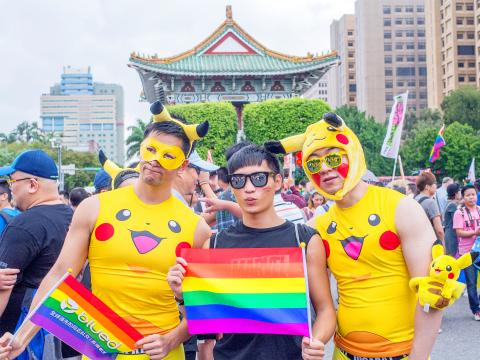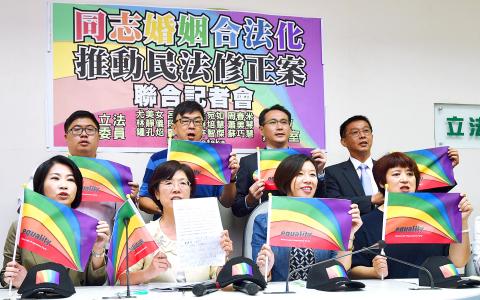To celebrate “pride month,” downtown Taipei once again transformed into a huge rainbow burst of music, dancing and cheering yesterday, as tens of thousands of lesbian, gay, bisexual and transgender (LGBT) people and their supporters proudly marched at the 14th Taiwan LGBT Pride parade (台灣同志遊行), one of Asia’s largest LGBT events.
With this year’s theme, “Fun together — honor diversity, like you mean it” (一起Fun出來—打破「假友善」,你我撐自在), organizers called on the public to break through “fake friendliness” when it comes to LGBT people.
“From gender stereotypes and HIV stigmas to sexual exploitation, this fake friendly attitude is only a cover that conceals discrimination,” wrote the organizers.

Photo: Paul Cooper, Taipei Times
Statements such as “I respect homosexuals, but they shouldn’t violate traditional family values” may not seem harmful, but do in fact express a discriminatory attitude.
“Such statements make discrimination subtler and more difficult to detect,” the organizers wrote.
LEE’S HATE SPEECH

Photo: Chien Jung-fong, Taipei Times
A typical example of such “fake friendliness” are the words recently uttered by Taiwanese actor Mark Lee (李天柱) at the 51st Golden Bell Awards (金鐘獎) in Taipei early this month.
“I don’t hate gay people. I love them, and I also have compassion for them. But I have to say that [being gay] is wrong,” Lee said.
The Christian actor flaunted his true colors backstage when he launched a homophobic rant after winning a Golden Bell Award for best actor in a miniseries or television film.
“I’ll be open about it. I don’t support homosexuality because it’s going to lead to the destruction of humanity and that of the nation,” Lee said.
Lee has rejected several gay-themed TV productions that have approached him. “I won’t betray my faith just for a little money. This is wrong. Homosexuality is a huge curse to our future generations,” the actor said, adding, as though we didn’t get it the first time: “What a curse.”
Lee says he is compassionate about difference, but his words are nothing but hate speech wrapped up in “fake friendliness.” Naturally, his remarks have caused outrage both at home and abroad — a reverse kind of “pride of Taiwan” (台灣之光).
It is worth noting that Lee made the remarks during an interview with Good TV (好消息電視台), a Christian-focused TV station funded by Gabriel Broadcasting Foundation (加百列福音傳播基金會), which targets a Christian audience.
“Lee’s offensive remarks are just the tip of the iceberg,” said social activist Jennifer Lu (呂欣潔) on Thinking-Taiwan (想想台灣), an online forum. “The massive amounts of money and power behind certain religious figures and TV stations, and their lack of understanding of LGBT people is what we face every day.”
A TEACHER’S DEATH
Following Lee’s outburst, the LGBT community was shocked to learn of the alleged suicide of French teacher Jacques Picoux, a tragedy that once again highlighted the woefully inadequate legal protection of same-sex couples.
Picoux moved to Taiwan in 1979 and taught at National Taiwan University until he retired in 2004. His same-sex partner Tseng Ching-chao (曾敬超), with whom he lived for 35 years, was the global agent for Chinese actress Gong Li (鞏俐).
Following Tseng’s death in October last year due to cancer, Picoux feel into a deep depression. Two weeks ago he allegedly jumped from the 10th floor of his apartment building.
The media reported that the couple had bought the apartment together under Tseng’s name. Against Tseng’s wishes, his brother inherited the property because, according to the Civil Code (民法), Picoux was “unrelated” to Tseng.
“They were ‘legal strangers’ (法律上的陌生人) after living together for 35 years,” wrote Lee Yen-jong (李晏榕), a lawyer and Picoux’s former student, on her Facebook page. “Despite their 35 years together, they were trampled by others just because they were not in a formal marital relationship,” the lawyer added, revealing that Picoux was not allowed to make any medical decisions for Tseng when he fell ill.
The case of Picoux and Tseng, and remarks by Mark Lee, are not the first of their kind, and certainly won’t be the last. The good news is that, on the eve of the gay parade, some legislators have announced a draft amendment to the Civil Code to legalize same-sex marriage. A total of 38 lawmakers from all parties except the People First Party have already signed it to support the draft bill. Could Taiwan be the first in Asia to legalize same-sex marriage? Taipei Watcher will discuss this more next month.

This is the year that the demographic crisis will begin to impact people’s lives. This will create pressures on treatment and hiring of foreigners. Regardless of whatever technological breakthroughs happen, the real value will come from digesting and productively applying existing technologies in new and creative ways. INTRODUCING BASIC SERVICES BREAKDOWNS At some point soon, we will begin to witness a breakdown in basic services. Initially, it will be limited and sporadic, but the frequency and newsworthiness of the incidents will only continue to accelerate dramatically in the coming years. Here in central Taiwan, many basic services are severely understaffed, and

Jan. 5 to Jan. 11 Of the more than 3,000km of sugar railway that once criss-crossed central and southern Taiwan, just 16.1km remain in operation today. By the time Dafydd Fell began photographing the network in earnest in 1994, it was already well past its heyday. The system had been significantly cut back, leaving behind abandoned stations, rusting rolling stock and crumbling facilities. This reduction continued during the five years of his documentation, adding urgency to his task. As passenger services had already ceased by then, Fell had to wait for the sugarcane harvest season each year, which typically ran from

It is a soulful folk song, filled with feeling and history: A love-stricken young man tells God about his hopes and dreams of happiness. Generations of Uighurs, the Turkic ethnic minority in China’s Xinjiang region, have played it at parties and weddings. But today, if they download it, play it or share it online, they risk ending up in prison. Besh pede, a popular Uighur folk ballad, is among dozens of Uighur-language songs that have been deemed “problematic” by Xinjiang authorities, according to a recording of a meeting held by police and other local officials in the historic city of Kashgar in

It’s a good thing that 2025 is over. Yes, I fully expect we will look back on the year with nostalgia, once we have experienced this year and 2027. Traditionally at New Years much discourse is devoted to discussing what happened the previous year. Let’s have a look at what didn’t happen. Many bad things did not happen. The People’s Republic of China (PRC) did not attack Taiwan. We didn’t have a massive, destructive earthquake or drought. We didn’t have a major human pandemic. No widespread unemployment or other destructive social events. Nothing serious was done about Taiwan’s swelling birth rate catastrophe.